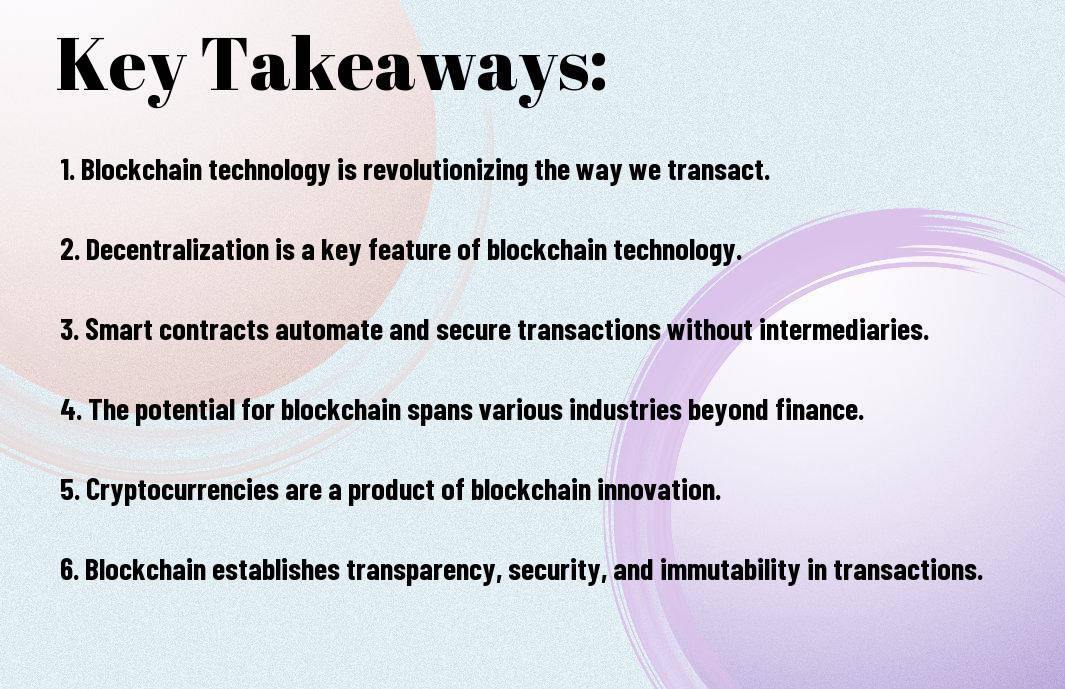The Future of Blockchain is Here! The economy is on the brink of a major revolution, with blockchain technology at the forefront of this transformative shift. From finance to healthcare, supply chain management to voting systems, blockchain is revolutionizing the way we conduct transactions and secure data. This groundbreaking technology offers unprecedented security and transparency, making it a game-changer in various industries.

Key Takeaways:
- Decentralization: Blockchain technology is enabling a shift towards decentralized systems, allowing for peer-to-peer transactions without the need for intermediaries.
- Transparency: The transparent and immutable nature of blockchain ensures that all transactions are recorded on a public ledger, reducing the risk of fraud and increasing trust.
- Smart Contracts: Smart contracts are self-executing contracts with the terms of the agreement directly written into code, automating processes and enhancing efficiency.
- Tokenization: Tokenization of assets on the blockchain allows for fractional ownership of assets, enabling more people to participate in investments traditionally out of reach.
- Supply Chain Management: Blockchain technology is revolutionizing supply chain management by providing an immutable record of products from creation to delivery, enhancing transparency and reducing inefficiencies.
- Security: Blockchain’s cryptographic and decentralized nature makes it highly secure, protecting data and transactions from unauthorized access and potential fraud.
- Impact on Industries: Blockchain is disrupting various industries including finance, healthcare, real estate, and supply chain, creating new business models and opportunities for innovation.

Blockchain Basics
One Blockchain technology, produce and the digital economy has revolutionized various industries by offering decentralized and secure transactions. Understanding the fundamentals of blockchain technology is crucial in grasping its impact on the new economy.
Understanding Blockchain Technology
Basics – Blockchain is a decentralized digital ledger that records transactions across multiple computers in a way that is secure, transparent, and tamper-proof. Each transaction is verified by network participants, known as nodes, before being added as a new block to the chain. This creates a permanent and unchangeable record of transactions.
Key Features of Blockchain
Basics – The key features of blockchain technology include:
- Decentralization: Transactions are verified by network participants, eliminating the need for intermediaries.
- Transparency: All participants have access to the same ledger, reducing the risk of fraud.
- Immutability: Once a transaction is recorded, it cannot be altered or deleted.
- Security: Cryptography ensures the security of transactions, making blockchain resistant to hacks.
Recognizing these key features is imperative in understanding the benefits of blockchain technology in the new economy.
Different Types of Blockchains
Features – Blockchain technology can be categorized into different types based on their accessibility and permissions, such as:
- Public Blockchains: These are open to anyone for participation and validation of transactions.
- Private Blockchains: Restricted access is granted to participants, making them suitable for businesses and organizations.
- Consortium Blockchains: A group of organizations controls the consensus process, ideal for industry-specific use cases.
Thou should consider the type of blockchain that best suits your business needs when implementing blockchain technology.
On the topic of different types of blockchains, it’s important to note that each type offers unique advantages and challenges. It is crucial for businesses to assess their requirements and choose the blockchain type that aligns with their goals and objectives. Adopting the right type of blockchain can significantly impact the success and efficiency of operations in the new economy.
Blockchain and the Global Economy
Unlike traditional centralized systems, blockchain technology is revolutionizing the global economy by offering decentralized, secure, and transparent transactions. According to A look into the future of blockchain technology – PMC, the potential applications of blockchain are limitless and are set to disrupt various industries on a global scale.
Impact on Financial Services
Economy: Blockchain has the potential to reshape the financial services industry by providing faster and more cost-effective transactions. The technology eliminates the need for intermediaries, reducing transaction costs and improving overall efficiency. This innovation is particularly disruptive in areas such as cross-border payments, securities trading, and regulatory compliance.
International Trade and Supply Chains
Services: Blockchain technology is transforming international trade and global supply chains by increasing transparency, traceability, and security. By enabling real-time tracking of goods and verifying transactions instantaneously, blockchain reduces the risk of fraud and errors in cross-border trade. This increased efficiency results in faster delivery times and lower costs for businesses.
Plus, the immutability and transparency of blockchain records provide a reliable and tamper-proof audit trail, which is beneficial for regulatory compliance and dispute resolution in international trade.
Investment and Asset Management
To invest and grow their assets in the global economy, organizations are turning to blockchain technology for more efficient and secure asset management. Blockchain allows for fractional ownership of assets, tokenization of traditional securities, and automated smart contracts for asset transfers. These innovations streamline investment processes, reduce delays, and increase liquidity in asset markets.
Understanding the transformative power of blockchain technology in the global economy is important for businesses and policymakers to adapt and thrive in the evolving digital landscape.
Blockchain in Business
Despite the initial skepticism, blockchain technology is increasingly being recognized as a game-changer in various industries. Its transparency, security, and efficiency make it a valuable asset for businesses looking to streamline their operations and stay ahead in the market. To probe deeper into the role of blockchain in shaping the new economy, check out The Role of Blockchain Technology in New Economy.
Smart Contracts
An crucial application of blockchain technology in the business world is the use of smart contracts. These self-executing contracts with the terms of the agreement directly written into code enable automated transactions and eliminate the need for intermediaries. Smart contracts ensure trust and efficiency in business operations, making them a popular choice for various industries.
Decentralized Autonomous Organizations (DAOs)
DAOs are entities governed by code and run by consensus of its members, utilizing blockchain technology to enable decentralized decision-making and management. DAOs operate autonomously, without the need for traditional hierarchical structures, allowing for a more transparent, secure, and efficient organizational model.
For instance, a DAO could be used to manage a decentralized investment fund where decisions on investment strategies are made collectively by token holders, without the need for a centralized authority.
Tokenization of Assets
With the rise of blockchain technology, assets can now be digitized and represented as tokens on a blockchain. This process, known as tokenization, allows for the fractional ownership of assets, increased liquidity, and improved accessibility to investment opportunities. Tokenization of Assets has revolutionized the way traditional assets, such as real estate or art, are bought, sold, and traded.
Decentralized finance platforms have leveraged tokenization to create new investment avenues, such as tokenized securities or digital artworks, providing individuals with previously inaccessible opportunities to diversify their portfolios.

The Rise of Cryptocurrencies
Bitcoin and the Origin of Cryptocurrencies
Keep in mind that Bitcoin was the pioneer in the world of cryptocurrencies, introduced by an unknown person or group of people under the pseudonym Satoshi Nakamoto in 2009. It brought about a decentralised form of digital currency, allowing for peer-to-peer transactions without the need for intermediaries such as banks. The idea was to create a secure, transparent, and unchangeable system of financial transactions that could be accessible to anyone with an internet connection.
Altcoins and the Expansion of the Market
Expansion in the cryptocurrency market came with the introduction of alternative coins, known as altcoins. These coins are imperatively any cryptocurrency other than Bitcoin. Ethereum, Ripple, and Litecoin are among the most well-known altcoins. These alternative digital currencies were created to address certain limitations of Bitcoin, such as scalability, transaction speed, and energy consumption. Altcoins have diversified the market, offering investors a wider range of options for digital investments.
This diversification has led to increased competition and innovation within the cryptocurrency space. Altcoins often introduce new features or technologies that improve upon existing blockchain frameworks, pushing the industry towards greater efficiency and utility.
Regulatory Landscape for Cryptocurrencies
One of the key challenges facing the cryptocurrency industry is the evolving regulatory landscape. Governments around the world are grappling with how to regulate and tax cryptocurrencies, as they straddle the line between currency, commodity, and security. Regulatory uncertainty can create volatility and risk for investors, while clear and favourable regulations can foster growth and legitimacy for the industry.
Cryptocurrencies operate on a global scale, making it challenging for any single jurisdiction to effectively regulate them. International cooperation and standardisation efforts are imperative to creating a harmonised regulatory framework that protects consumers and promotes innovation in the digital asset space.

Blockchain and Identity
Digital Identity Solutions
Identity is a fundamental aspect of our lives, and as our world becomes more digitized, the need for secure and efficient digital identity solutions grows. Blockchain technology offers promising solutions in this area by providing a decentralized, tamper-proof way to manage digital identities. Using blockchain, individuals can have more control over their personal information and how it is shared with others. This can lead to greater privacy and security in online transactions and interactions.
Privacy and Security Concerns
One of the key concerns surrounding digital identity and blockchain is ensuring the privacy and security of personal information. While blockchain offers enhanced security through its decentralized and transparent nature, there are still risks involved. Hackers may target vulnerabilities in the system, and if a person loses their private key, they could permanently lose access to their digital identity. Additionally, the immutability of blockchain means that once data is recorded, it cannot be altered, posing challenges in the event of errors or misinformation.
It is crucial for individuals and organizations to implement strong security measures and best practices when utilizing blockchain for digital identity purposes. This includes using secure storage methods for private keys, implementing multi-factor authentication, and regularly updating security protocols to address emerging threats.
The Role of Blockchain in Compliance
On the regulatory front, blockchain technology has the potential to revolutionize compliance in various industries. By providing a transparent and immutable ledger of transactions, blockchain can simplify auditing processes and ensure that regulatory requirements are met. This can result in more efficient and cost-effective compliance procedures for businesses while reducing the risk of fraud and non-compliance.
Privacy regulations are becoming increasingly stringent, and blockchain technology offers a means to securely manage and protect sensitive data while ensuring compliance with data protection laws such as GDPR. Organizations that leverage blockchain for compliance activities can benefit from improved data integrity, transparency, and accountability, ultimately enhancing trust with stakeholders and regulators.
Challenges and Considerations
Scalability and Efficiency Issues
For any blockchain technology to truly revolutionize the economy, it must address scalability and efficiency issues. An necessary consideration is the ability of a blockchain network to handle a high volume of transactions without compromising speed or security. The current blockchain networks, like Bitcoin and Ethereum, face challenges in scalability due to the limit on the number of transactions they can process per second.
Interoperability Between Different Blockchains
For blockchain technology to reach its full potential, seamless interoperability between different blockchains is crucial. An interoperable blockchain ecosystem would allow different blockchain networks to communicate and share information, enabling a more connected and efficient decentralized system.
Issues arise when different blockchains operate in isolation, hindering the flow of information and value between networks. Interoperability solutions such as cross-chain communication protocols and interoperability platforms are being developed to address these challenges.
Legal and Ethical Implications
One of the critical considerations in the adoption of blockchain technology is the legal and ethical implications surrounding its use. The decentralized and immutable nature of blockchain can raise concerns regarding data privacy, security, and regulatory compliance. Smart contracts, for example, present legal challenges as they are executed automatically once the conditions are met, leaving little room for dispute resolution.
Scalability remains a key focus in blockchain technology development, as increasing the transaction processing speed and capacity is crucial for mainstream adoption. Solutions like sharding, layer 2 protocols, and consensus algorithm upgrades are being explored to improve scalability without compromising decentralization and security.
Looking Ahead
Emerging Trends in Blockchain Technology
Now, let’s explore the emerging trends in blockchain technology that are shaping the future of the economy. An increasing focus on scalability and interoperability is driving the development of new blockchain solutions. Projects like Polkadot and Cosmos are working to create networks that can communicate with each other, allowing for seamless transfers of value across different blockchains. Additionally, Layer 2 solutions like Lightning Network for Bitcoin and Raiden Network for Ethereum are improving transaction speeds and reducing fees, making blockchain more accessible for everyday use.
The Role of Blockchain in Future Technological Innovations
Emerging as a disruptive force, blockchain technology is set to play a pivotal role in future technological innovations. With advancements in areas such as smart contracts, decentralized finance (DeFi), and digital identity, blockchain is revolutionizing industries beyond just finance. Emerging trends indicate that blockchain will underpin the development of Internet of Things (IoT) devices, supply chain management systems, and even voting mechanisms, bringing trust, security, and efficiency to a wide array of applications.
An innovative example of blockchain integration in future technological innovations lies in healthcare. By utilizing blockchain for secure data sharing and transparent medical records, patients can have greater control over their health information while healthcare providers can ensure the integrity and privacy of sensitive data.
Preparing for a Blockchain-Driven Future
Blockchain technology is advancing at a rapid pace, and preparing for a blockchain-driven future is vital for businesses and individuals alike. By familiarizing themselves with blockchain fundamentals, businesses can identify opportunities for optimization and growth. Additionally, investing in blockchain education and talent development can help organizations stay competitive in a rapidly evolving digital landscape.
Blockchain-driven companies are increasingly seeking to leverage decentralized finance (DeFi) platforms for lending, borrowing, and trading digital assets. By embracing these innovations, businesses can streamline operations, reduce costs, and expand their market reach through borderless transactions.
The Transformational Potential of Blockchain
Preparing for the transformational potential of blockchain requires a shift in mindset towards decentralized systems and increased transparency. By embracing blockchain technology, industries can streamline processes, enhance security, and foster greater trust among stakeholders. The immutable nature of blockchain ensures that data integrity is maintained, reducing the risk of fraud and manipulation.
Final Thoughts on Blockchain and the Economy
It is evident that blockchain technology is here to stay and will continue to have a profound impact on the economy. The potential for blockchain to revolutionize financial services, supply chain management, healthcare, and other sectors is immense. Embracing blockchain innovation and staying informed about new developments will be key for individuals and businesses seeking to thrive in the digital economy.
FAQ The Future of Blockchain
Q: What is blockchain technology?
A: Blockchain technology is a decentralized, distributed ledger that securely records transactions across a network of computers. Each transaction is stored in a block that is linked to the previous block, forming a chain of blocks hence the name “blockchain”.
Q: How is blockchain reshaping the new economy?
A: Blockchain is reshaping the new economy by revolutionizing the way transactions are conducted, removing the need for intermediaries, increasing transparency, and enhancing security and efficiency in various industries.
Q: What are some key benefits of blockchain technology?
A: Some key benefits of blockchain technology include decentralized control, enhanced security, transparency, immutability of data, reduced costs, increased efficiency, and faster transactions.
Q: In what industries is blockchain technology being widely adopted?
A: Blockchain technology is being widely adopted in industries such as finance, supply chain management, healthcare, real estate, voting systems, music and entertainment, and legal sectors.
Q: How does blockchain ensure security and privacy of transactions?
A: Blockchain ensures security and privacy of transactions through cryptographic encryption, consensus mechanisms, decentralized network, and immutable records. Each transaction is verified by multiple nodes on the network before being added to the blockchain.
Q: What are smart contracts and how do they work on the blockchain?
A: Smart contracts are self-executing contracts with the terms of the agreement directly written into lines of code. These contracts automatically execute and enforce the terms when predefined conditions are met, without the need for intermediaries, thereby streamlining processes and reducing costs.
Q: What are some challenges facing blockchain technology adoption?
A: Some challenges facing blockchain technology adoption include regulatory uncertainties, scalability issues, interoperability between different blockchains, energy consumption in mining, and the perception of being associated with illicit activities like money laundering.



